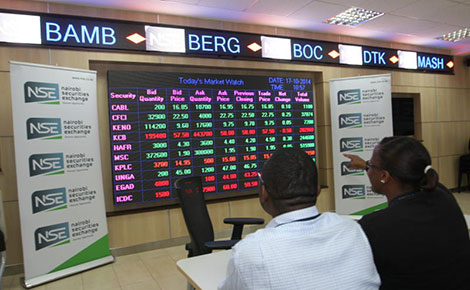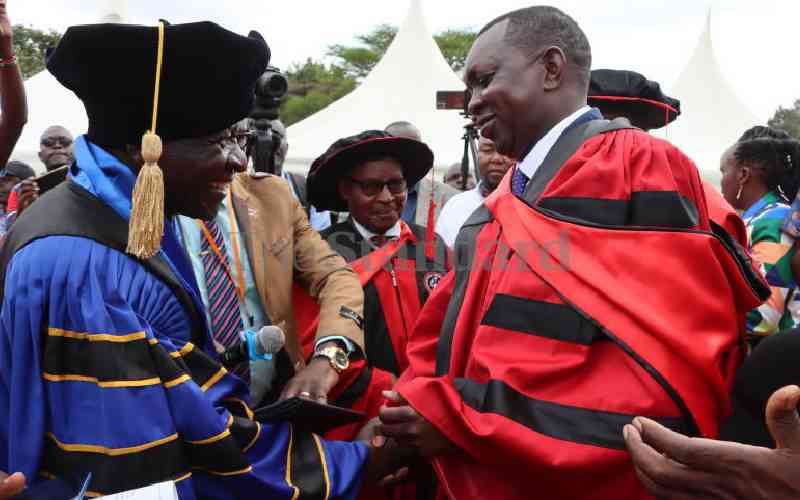 |
|
Nairobi securities Exchange (NSE) trading floor. [PHOTO BY BEVERLYNE MUSIKL/STANDARD] |
Kenya: The cost of selling shares at the Nairobi Securities Exchange (NSE) has gone up by five per cent after the National Treasury reintroduced the Capital Gains Tax (CGT).
Although sources in the Government who asked not to be named said Treasury hopes to raise Sh7.5 billion from the CGT, market players at the NSE are worried that it will have a negative long-term effect on trading, something the Cabinet Secretary for the National Treasury, Mr Henry Rotich, was at pains to dispel yesterday.
"I understand the apprehension in the sector. However its design and implementation will be done in a way that will not hurt the sector," said Rotich.
"We will work with all stakeholders including the Kenya Revenue Authority to ensure that its implementation will not affect the growth we have achieved over the years," he said.
But it is not just land that is affected as the cost of buying land and buildings will also increase because any proceeds from their sale will also attract the CGT. . This follows the passage into law of the Finance Bill, which re-introduced the tax on the transfer of properties by persons.
Penalties and interest
The capital markets' growth is considered critical for the financing the Government''s mega infrastructure projects in energy, transport and water sectors and it is not clear how negatively the tax will affect the bourse.
In an advert in the The Standard yesterday, the KRA warns that the CGT is due and payable upon transfer of property and any delay or failure will attract penalties and interest, if any, and the incidental costs of acquiring the property.
"Kenya Revenue Authority wishes to inform the public that the Finance Act 2014 has reintroduced Capital Gains Tax on transfer of property by a person with effect from January 1, 2015," read in part the announcement.
Under the Income Tax Act, properties, include land, buildings and investment shares will attract the five per cent CGT. Plans for the re-introduction of the controversial tax are part of the National Treasury's efforts to finance the Government's ballooning expenditures by taxing the wealthier Kenyans.
"It was important that we have it first then we work on the implementation process. We have started with the lowest rate, but review will depend on how sectors perform going forward. For now we want to keep rates as stable as possible. What we need to do is to widen the tax base," explained Rotich.
"We don't need to change it very soon. Tax rates are revised when circumstances change. We are in a dynamic world," he said.
According to PricewaterhouseCoopers (PwC) the tax, which is imposed on real estate, marketable securities and other saleable assets, is likely to have an impact on all sectors of the economy.
"However the major impact is likely to be felt in the property and financial markets if the exemption on marketable securities such as shares is not retained," said Steve Okello, Head of tax at PwC at an earlier interview.
Marketable securities include NSE listed shares and bonds. The tax becomes effective from January 1, 2015. Prior to the signing of the Finance Act 2014 into law, the tax was suspended from June 1985. By re-introducing it, the Government aims to increase tax revenue.
Stay informed. Subscribe to our newsletter
 The Standard Group Plc is a
multi-media organization with investments in media platforms spanning newspaper
print operations, television, radio broadcasting, digital and online services. The
Standard Group is recognized as a leading multi-media house in Kenya with a key
influence in matters of national and international interest.
The Standard Group Plc is a
multi-media organization with investments in media platforms spanning newspaper
print operations, television, radio broadcasting, digital and online services. The
Standard Group is recognized as a leading multi-media house in Kenya with a key
influence in matters of national and international interest.
 The Standard Group Plc is a
multi-media organization with investments in media platforms spanning newspaper
print operations, television, radio broadcasting, digital and online services. The
Standard Group is recognized as a leading multi-media house in Kenya with a key
influence in matters of national and international interest.
The Standard Group Plc is a
multi-media organization with investments in media platforms spanning newspaper
print operations, television, radio broadcasting, digital and online services. The
Standard Group is recognized as a leading multi-media house in Kenya with a key
influence in matters of national and international interest.







